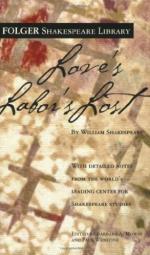|
This section contains 743 words (approx. 2 pages at 400 words per page) |

|
Love's Labor's Lost Summary & Study Guide Description
Love's Labor's Lost Summary & Study Guide includes comprehensive information and analysis to help you understand the book. This study guide contains the following sections:
This detailed literature summary also contains Further Study on Love's Labor's Lost by William Shakespeare.
Love's Labor's Lost focuses on the problem of telling the truth. The play opens with a solemn vow to study and to avoid the company of women. But the king of Navarre, who as leader ought to be a model of truth and virtue, breaks his own promise in the second scene of the play. After that, all of his followers break their promises as well: instead of avoiding women, they fall in love with and pursue the ladies of France who are visiting the king's court. But because they have already broken their first vow, their promises of love do not ring true. Although all four of them write effective love poems, clever poetry does not necessarily express sincere feeling. Even more telling, in the Masque of the Muscovites when everyone involved is disguised, the men cannot recognize their ladies, though the ladies recognize the men. The love promises that the lords have made seem particularly hollow if they cannot even tell their love objects apart. The ladies question the lords' capacity to speak truly of love at all. In modern times as well, the effort to speak truthfully about one's feelings remains difficult. It is often easier to make promises than it is to keep themespecially when it comes to love relationships. Further, it is often easier to love one's ideal image of someone than to recognize him or her for who he or she is. .
Yet the ladies in the play insist that it is in fact possible to speak truly, not only of love but of other things as well. The play is full of banter and wordplay, and the ladies participate in the clever use (and abuse) of words just as much as the lords. But the ladies mock the lords in order to point out their mistakes and offer insight, for example after the Masque of the Muscovites. In addition, the ladies mock themselves and each other without being cruel or destructive, whereas the men make fun of the Nine Worthies actors to the point of injuring them. Rosaline points out that the "prosperity" or usefulness of words does not depend on the experience of the speaker, but upon the effect on the audiencein other words, clever language and wordplay are not "prosperous" if they cause harm to those who hear them. The lords behave like bullies, making fun of less privileged men, much as the school bully might make fun of the weaker kids in class. The meaning of words depends on how the audience understands them, not on how much fun the bully might have in his mockery.
To modern audiences, the idea of establishing an "academy" at court might seem foreign. Nothing like the court system exists in modern life in many countries; the renaissance court was a legal and political hub, but also a social center where young gentlemen and gentlewomen lived lives of leisure supported by royalty. The king of Navarre's court is more like a boarding school or college than like a political or legal center. And the academy of Love's Labour's Lost represents a rather extreme version of what happened regularly in Renaissance courts: the education of young men (and to some extent women). Young courtiers were taught to read and write as well as to behave like gentlemen. The king of Navarre has a particularly idealistic notion of the study involved in courtly life. He thinks that in order to create a court as a center of learning, the members of the court must be extreme in swearing off almost all other activity. He even goes so far as to insist that love and studying are mutually exclusive. Certainly in modern life the same conflict can recurthe conflict between studying and social life, or between work and love. Indeed, there are plenty of parents who require that their children finish their homework before they see their friends, and plenty of college students who, like the lords of Navarre, confront the difficulties of balancing study with newfound desires. But what makes the court of Navarre particularly unconventional is that in the end, neither study nor love wins out. The "academy" is destroyed, but there is nothing left in its place. The king and all his lords are sent off to different corners of the world to live alone and contemplate their lives. In effect, the court itself is exposed as a superficial and untrustworthy place.
Read more from the Study Guide
|
This section contains 743 words (approx. 2 pages at 400 words per page) |

|



